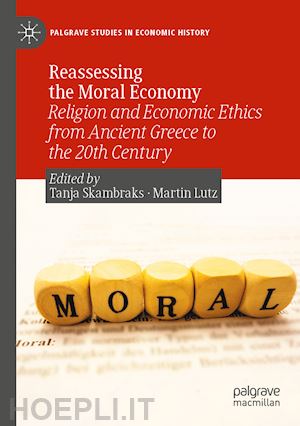

Questo prodotto usufruisce delle SPEDIZIONI GRATIS
selezionando l'opzione Corriere Veloce in fase di ordine.
Pagabile anche con Carta della cultura giovani e del merito, 18App Bonus Cultura e Carta del Docente
This book examines the concept of moral economy originally established by E.P. Thompson, focusing on the impact of religious norms on economic practice. With each chapter discussing a different empirical case study, the interrelations of the economy and religion are explored from antiquity through to the 20th century. The long-term trajectory and comparative perspective allows for moral economy to be seen in relation to ancient Greek commerce, medieval pawn-broking, Christian and Jewish economic ethics, urban social politics during the Plague, the Jesuit mission in Paraguay, the Ottoman Empire, religion in modern American capitalism, and Catholic attitudes toward taxation.
This book aims to provide insight into how moral thinking about the economy and economic practicehas evolved from a long historic perspective. It will be relevant to students and researchers interested in economic history and cultural economics.
Introduction (Martin Lutz and Tanja Skambraks).- Part 1: Antiquity and Middle Ages.- Chapter 1.The Popular Morality of Ancient Greek Commerce (Moritz Hinsch).- Chapter 2. Early medieval property transfers in favour of the church between religion and economy (Franziska Quaas) .- Chapter 3. Between Pietas and Usury. Dynamics of a Moral Economy in the Middle Ages (Tanja Skambraks).- Chapter 4. Past the Limits of Usury: Jews and the Moral Economy of Moneylending in the Late Medieval German Territories (Aviya Doron).- Part 2: Early Modern Period.- Chapter 5.The Moral Economy of Epidemics. Emergency, Charity and Poor Relief in Early Modern Italian Plague Regulations (Lorenzo Coccoli).- Chapter 6. Fiscality, Debt, and Moral Economy: The View from Florentine Civic Chronicles (Giorgio Lizzul).- Chapter 7. Moral Economists. The Jesuit Mission in Paraguay and the Idea of Economic Growth in Early Modern Times (David Bete & Philip Knäble, Georg-August-Universität Göttingen).- Chapter 8. Profit due to Christian behaviour. The Moral Economy of the Moravian Church in the 18th Century (Thomas Dorfner).- Part 3: Modern Period.-Chapter 9. Negotiating Religion, Moral Economy and Economic Ideas in the Late Ottoman Empire: Perspectives of Peasants and the Intelligentsia (E. Attila Aytekin).- Chapter 10. Leading a “simple” life in modern capitalism. The moral economy of Mennonite consumption in mid-20th century America (Martin Lutz).- Chapter 11. Tax Morale in a Centralised Church: How Catholic Clergies Adapted Norms of Paying Taxes to Secular Institutions (1940s–1950s) (Korinna Schönhärl).- Chapter 12.“Resort City? Why what happened to Las Vegas, Sin City?”: Suburban America, Religious Groups, and the Moral Economy of Gambling in Las Vegas, 1945-1969 (Paul Franke).- Chapter 13.Reassessing Moral Economies. Concluding thoughts (Benjamin Möckel).
Tanja Skambraks is Professor of Medieval History at Karl-Franzens-University Graz, Austria. Her second book is about “Charitable Credit: the Monti di Pietà, Franciscan Economic Ethics and Poor Relief in late medieval Italy (15th and 16th century)”. Her research and publications focus on economic and social history, especially financial and banking history as well as methodology, material culture and the history of rituals.
Martin Lutz is a social and economic historian at Humboldt University of Berlin. He has published on German-Soviet economic relations, the transnational Siemens family and its globalization strategies in the 19th century and German exploitation of Ukraine during World War II. His current work looks at religion in modern capitalism.











Il sito utilizza cookie ed altri strumenti di tracciamento che raccolgono informazioni dal dispositivo dell’utente. Oltre ai cookie tecnici ed analitici aggregati, strettamente necessari per il funzionamento di questo sito web, previo consenso dell’utente possono essere installati cookie di profilazione e marketing e cookie dei social media. Cliccando su “Accetto tutti i cookie” saranno attivate tutte le categorie di cookie. Per accettare solo deterninate categorie di cookie, cliccare invece su “Impostazioni cookie”. Chiudendo il banner o continuando a navigare saranno installati solo cookie tecnici. Per maggiori dettagli, consultare la Cookie Policy.